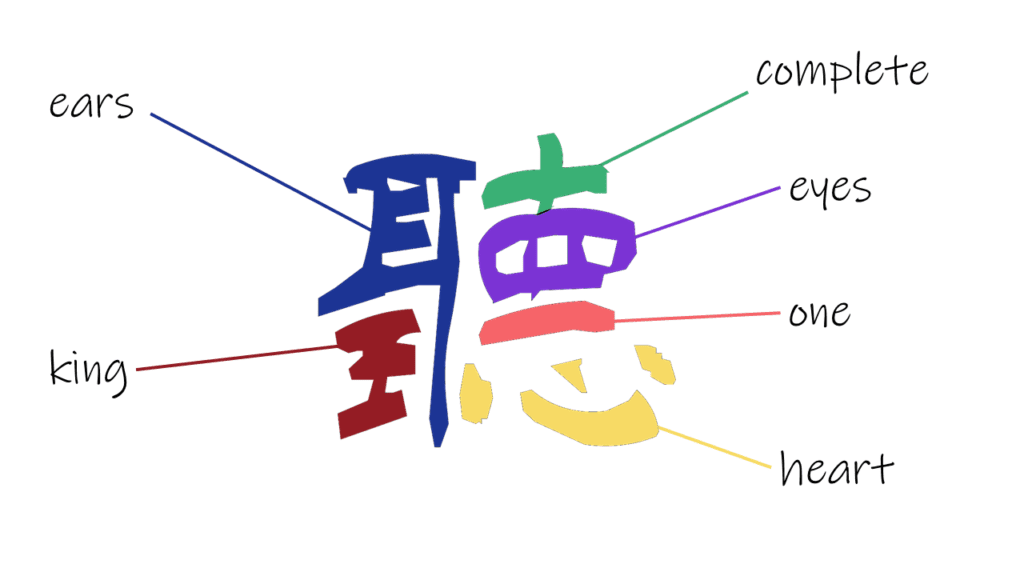Life
The Anatomy of Genuine Listening From a Traditional Chinese Character

The oxford dictionary defines “listen” as “giving one’s attention to a sound.” While this definition captures an essential part of the definition, it oversimplifies the listening process. Listening involves giving! Giving a lot more than mere attention, but undivided attention.
Listening involves giving our heart, eyes, effort, love and so much more. The process of listening is so complex that no single definition can fully capture what really happens when one listens. As a result, from a single Traditional Chinese character, I will show that “genuine listening” involves more than auditory perception.

(“聽“ pronounced “ting” ) which literally means “listen” is a phono-semantic compound made up of several distinctive parts, each carrying meaning that represents what we actually “give” when involved in the listening process. As can be seen from the character, the word “耳” which means “ear” is just part of a whole. Listening involves more than auditory perception. Genuine listening happens when instead of saying “I am all ears” we say “I am all present.”
Genuine listening means giving our heart (心 – xin)
People come to us, because they need to be understood. Listening to them with empathy could be the greatest gift we will ever give them. Being heard and understood feels good because it is connected to our deepest sense of self-worth. Listening to someone with empathy means caring and acknowledging.
Empathetic listening can’t unfold when we are overwhelmed by worries. The golden rule is to be self-aware and to never get into a conversation when we’re not emotionally prepared. Any attempt to get into a conversation when we don’t feel like it will come across insincere and can’t be concealed.
Listening with empathy gives the other person a chance to unfold as they are and to fully express themselves. This meaning is conveyed by the character (心 pronounced “xin” meaning“Heart”).
“The most basic of human need is to understand and be understood. The best way to understand people is to listen to them.”- Ralph Nichols
Genuine listening means maintaining eye-contact (目)
When engaged in a conversation, words represent a fraction of the meaning that is conveyed. A lot more information is transmitted nonverbally. Albert Mehrabian, a pioneer researcher of body language in the 1950’s, found that the total impact of a message is about 7 percent verbal, 38 percent vocal and 55 percent nonverbal. Since then, many researchers have replicated his research and found consistent results.
Respectful eye-contact is the agent that dissolves the boundary between the verbal and nonverbal. It brings a pure quality of receptivity as it opens the window to content and context of the message. Rid yourself of all visual distractions, open the window to your soul to person talking to you. This is the meaning of the “eyes” part of the Chinese character “目”(pronounced “mu”) which literally means “eyes.”
Listening means giving your undivided attention as you would a king (王)
When was the last time you gave your undivided attention to someone you were talking to? The challenge here is to bring our full attention to the person whom we are talking to. Listening with undivided attention means do away with external distractions as well as with internal distractions.
Oftentimes we listen with our attention focused on how we are going to respond or refute what the other person is saying. Genuine listening is different, it involves listening with curiosity, compassion, and with the true purpose of understanding. Imagine being invited to a royal feast. Treat the other person as a king, your guest of honor, because they are. This is what these Chinese characters mean (pronounced “yi” meaning “one,” and 王 pronounced, “wang” meaning “king”).
“Hearing is listening to what is said. Listening is hearing what isn’t said.” – Simon Sinek
Genuine listening assumes everyone is whole (十 )
The evidence of fingerprinting conveys an important truth that seems to elude us most of the time: each of us is unique. There are no “two” individuals with the same fingerprint. If we hold this simple fact upfront, we shall become more tolerant. We shall stop using our perceptual filters to judge others when difference of opinions emerges.
We become fully appreciative of the other, understanding that their uniqueness and wholeness are to be celebrated. This new paradigm shift will allow us to be whole again, and consequently make those around us feel the same. After all, if you see yourself as an individual worthy of being understood for who you are, why not do the same to others? This is the meaning conveyed by the last Chinese character 十 (shi), which means complete.
Imagine a world where everyone felt heard and understood. Wouldn’t you want to live in a such a world? I would! May these simple yet powerfully transformative principles inspire you to help create a culture built around empathy and love.
Image courtesy of Twenty20.com
Life
Imposter Syndrome Is Rooted in Your Past But Here’s How You Can Rewire It
Imposter syndrome is most prevalent in highly successful women

Imposter syndrome is “the persistent inability to believe that one’s success is deserved or has been legitimately achieved as a result of one’s own efforts or skills.” (more…)
Life
The Surprising Mental Health Tool You Probably Haven’t Tried
Through journaling, I arrived at a more balanced perspective, it reinstated my sense of gratitude and led me to accept my disability

In two particularly difficult times in my adult life, my journaling practice is helping me heal emotionally. It has been a vital tool for helping me see the bigger picture and land in a place of gratitude. (more…)
Life
How to Stop Comparing Yourself to Others and Find True Happiness
Comparison is the thief of joy; it robs us of our happiness, self-esteem, and peace of mind

In today’s hyperconnected world, it’s easier than ever to fall into the trap of comparing ourselves to others. Social media platforms like Instagram, Facebook, and LinkedIn constantly bombard us with curated highlights of other people’s lives, making it seem like everyone else is happier, more successful, and more fulfilled than we are. (more…)
Life
Harness the ‘Battery Effect’ to Transform Life’s Tensions into Your Greatest Strength
Recharge your life batteries by shifting your mindset today

I believe our life capacity is determined by the skillsets we develop on this spinning rock we call Earth. By “life capacity,” I mean our ability to embrace and sustain joy. (more…)
-

 Success Advice3 weeks ago
Success Advice3 weeks agoThe One Mindset Shift That Made Me Irreplaceable At Work
-

 Scale Your Business4 weeks ago
Scale Your Business4 weeks agoWhy Smart Entrepreneurs Never Skip This One Business Expense
-

 Success Advice3 weeks ago
Success Advice3 weeks agoHow Playing by the Rules Became the Smartest Business Strategy
-

 Did You Know2 weeks ago
Did You Know2 weeks ago7 Surprising Life Lessons Video Games Taught Me That School Never Did
-

 Success Advice2 weeks ago
Success Advice2 weeks agoHow to Build Trust, Kill Micromanagement, and Lead a Team That Thrives
-

 Scale Your Business2 weeks ago
Scale Your Business2 weeks agoHow to Build a Workplace People Actually Want to Show Up To
-

 Success Advice2 weeks ago
Success Advice2 weeks agoSuccess Isn’t Sexy: 5 Daily Habits That Actually Work
-

 Scale Your Business2 weeks ago
Scale Your Business2 weeks agoHow Smart Entrepreneurs Cut Financial Chaos in Half with One Simple Switch




























